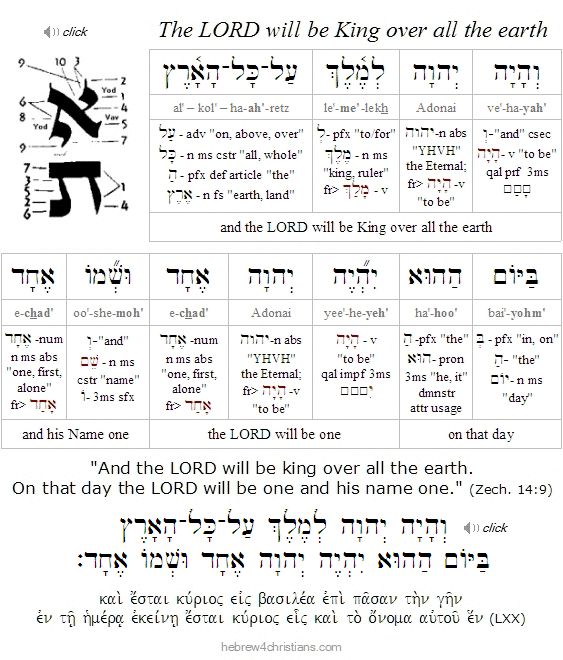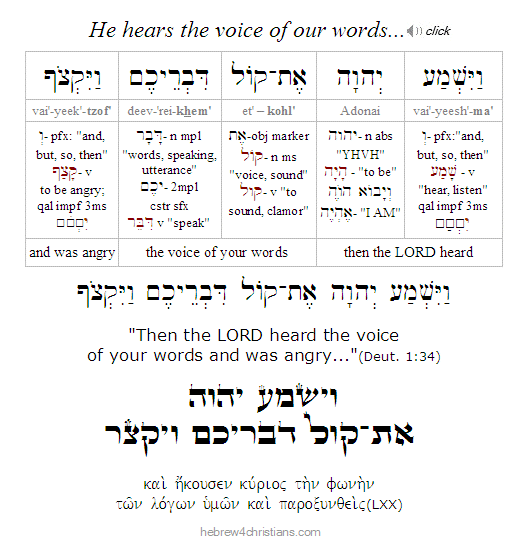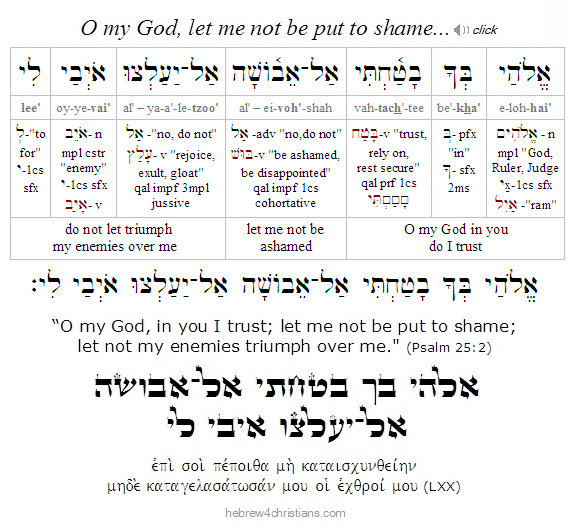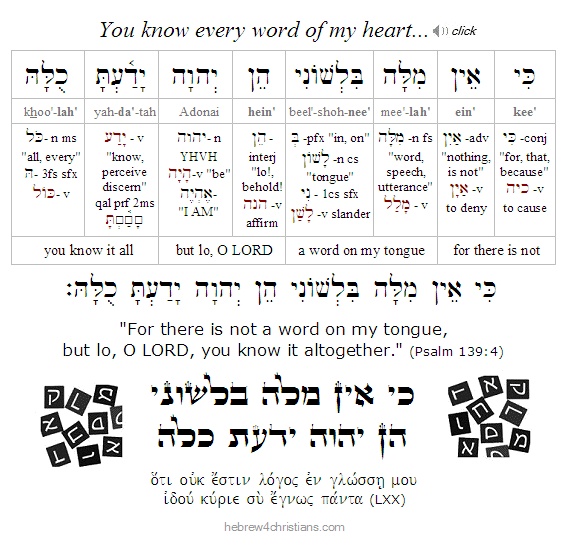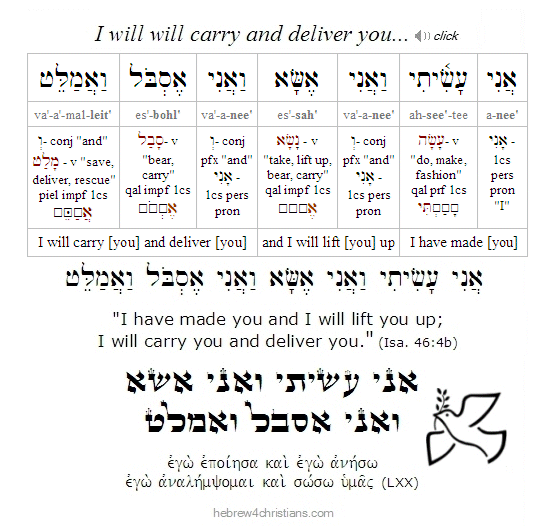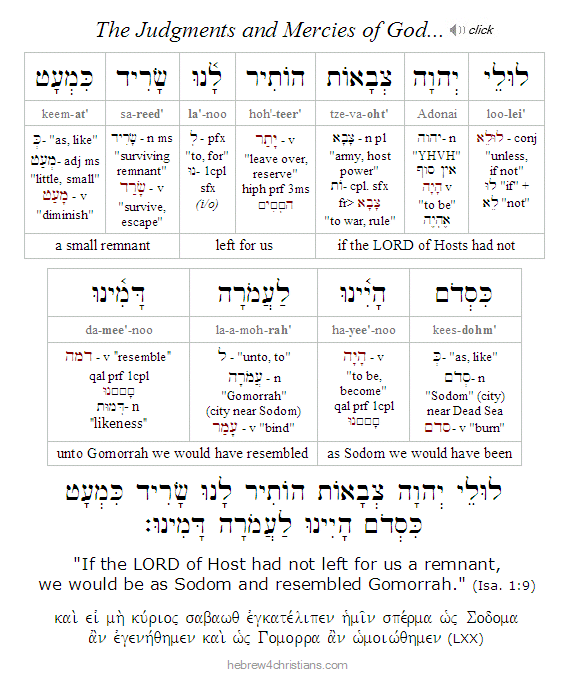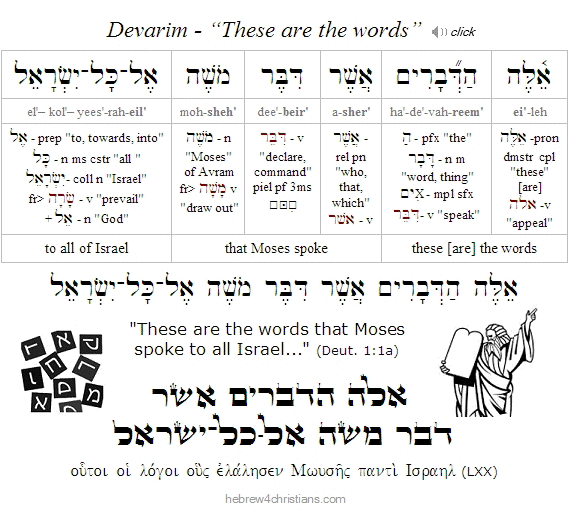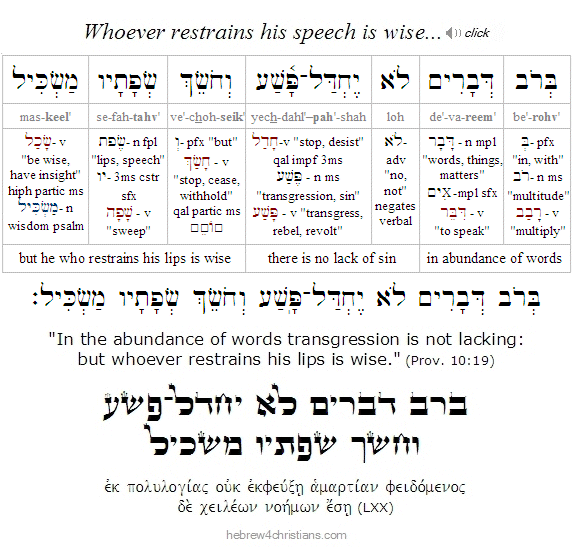|
August 2024 Updates (continued)
Note: If any page content appears to be missing, please refresh the page...
Trust in Dark Hours...
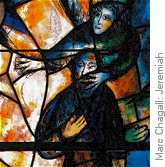
[ "Strengthen ye the weak hands, and confirm the feeble knees. Say to them that are of a fearful heart, 'Be strong, fear not: behold, your God will come with vengeance, even God with a recompence; he will come and save you.'" - Isaiah 35:3-4 ]
08.08.24 (Av 4, 5784) The Spirit of God encourages the heart that is downcast: "Let the one who walks in darkness and has no light trust in the Name of the LORD (יִבְטַח בְּשֵׁם יְהוָה) and lean upon on his God" (Isa. 50:10). Spiritual darkness is sometimes permitted by God for his own sovereign purposes, perhaps as a means to teach us to abandon ourselves to his care. Trusting in God (i.e., bittachon - בִּטָּחוֹן) does not mean that we are obligated to affirm that this is "the best of all possible worlds," though it does mean we believe that eventually God will wipe away every tear from our eyes and make all things right. The LORD will "true" all that is untrue within us.
Bittachon is a word for this world, which says, "Though he slay me, I will trust in him..." We do not need to exercise trust for what is seen in this world but for an unseen good (Rom. 8:24). Those who call upon the LORD believe not only in concealed good behind the ambiguous appearances ("all things work together for good") but more essentially in a future, real, substantive good that will one day be clearly manifest for us all... We fight the "good fight" of faith, which is a worthy struggle that eventually is realized for blessing. Meanwhile, we pray to God to be kept from such depth of sorrow that leads to sickness, darkness and despair. Amen.
Hebrew Lesson
Isaiah 50:10 reading (click for audio):
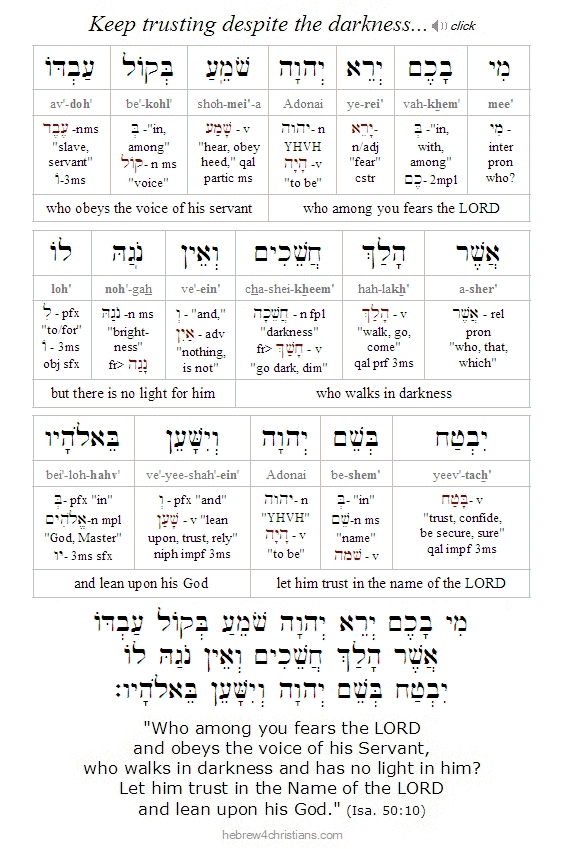 |
If you ask for bread, your heavenly Father will not give you a stone... Only God can deliver us from our "disordered loves" to take hold of what is truly essential. All we can do is ask, and keep on asking - even as we struggle on, despite ourselves, despite our losses... And we often revisit our sins over and over until we become "sick of our sickness," that is, until we begin to understand what our heart really needs. It's as if we are constantly being asked, "Is this what you want?" and our choices confess the truth... Only God does the miracle of real change within the human heart - only God can give life from the dead!
Life Worth Living...
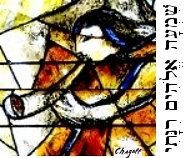
[ "Truth is so obscure in these times, and falsehood so established, that, unless we love the truth, we cannot know it." - Blaise Pascal ]
08.08.24 (Av 4, 5784) In our godless and profane age, it is common to encounter people who refuse to believe that God exists, not because there are compelling reasons to do so, but simply because they do not want God to exist, and therefore they willfully suppress the intuitions of logic, the apprehension of value, the awareness of glory in creation, and the sentiments of conscience, since all these experiences point to the realm of moral and spiritual reality.
As stated in Scripture: "For that which may be known of God is manifest in them; for God has revealed it to them. For the invisible attributes of him from the creation of the world are clearly seen, being understood by the things that are made, even his eternal power and divinity; so that they are without excuse" (Rom. 1:19-20). The Holy Spirit invites all people to be saved, but tragically so many "refuse to love and accept the truth that would save them" (2 Thess. 2:10).
Atheists and agnostics dogmatically insist that there is no transcendental "moral law" or Moral Lawgiver before whom all moral agents will give account, again, not because reason indicates that this is so, but on the contrary, merely because they wish to be "free" to do whatever they want and to pursue their own selfish desires. In this regard the atheist merely chooses to close his mind because he does not want to see (for an example of this type of madness, read Friedrich Nietzsche). As Rabbi Israel ben Eliezer (בש"ט) once said, "The world is full of majestic wonders and miracles but man takes his little hand and covers his eyes and sees nothing." Indeed the deification of the self makes the soul a stranger to God and myopic to moral and spiritual reality. The (post)modern man will split hairs and fastidiously object to questions of truth and meaning -- all for the sake of justifying a lifestyle that he pleases, on his own terms, without recognizing any moral authority beyond himself....
Everyone has a faith system by which they interpret and make sense of what they believe (or trust) is real... Socrates famously said that "the unexamined life is not worth living," which of course implies that a life worth living is discovered by asking questions, searching for meaning, pursuing truth, celebrating wonder, and living with integrity. "Seek the LORD while He may be found" (Isa. 55:6).
Contrary to the ideals of worldly culture, the meaning of life is not found in the pursuit of personal happiness (or pleasure) but rather in the pursuit of truth and meaning. Apathy about such matters is a symptom of lifelessness: it is to be spiritually dead while seemingly "alive." Indifferent people are likened to those who go through the outward motions of life without ever making inner traction with it... The righteous, even in death, are called "living"; the wicked, even while alive, are called "dead" (Berachot 18a).
A radical "metaphysical" question is "Why is there something rather than nothing at all?" Such a fundamental question strikes at the heart of our assumptions and habitual ways of thinking, jolting us from our sleepy "cave-like" consciousness to face the glaring light of the sun... The natural instinct is to turn away, to pull the covers over our head, and try to go back to sleep. However if pressed, the simple question "why" irresistibly leads to a series or "concatenation" of explanations and a regress of ostensible causes that quickly points to metaphysical properties and realities.
For instance, if a child asks her parent, "Why do people die?" the parent might answer, "Because people get sick or injured or they might grow very old." "But why do people have to grow old?" the child continues. "Because they are born, live for awhile, and eventually pass away... All things change, and that means they come into being, exist for a while, and then pass away. Look around you; everything you see – the people, the animals, the plants, rocks, mountains and seas, the earth and sky, the stars and galaxies, and indeed the whole universe – is constantly changing, coming into being, existing for awhile, and then passing away..." "But why does everything have to pass away?" the child persists...
In this imaginary dialog we see how quickly "why questions" begin pointing to deep metaphysical mysteries such as the nature of being, the phenomenon of time, the ubiquity of change and its existential relationship to human consciousness. The dialectic of asking and answering questions helps us detect the assumptions that underlie our everyday thinking, often revealing wonders that pervade our lives. The failure to seriously ask the "big questions" of life, for instance, "What am I?" "Where did I come from?" "Why am I here?" "Where am I going?" and "What does it all mean?" is to abandon what makes life itself worth living... It is to give up the quest to find meaning, purpose, hope, and a sense of destiny. It is to die inside.
Again categorically everyone has a faith system by which they exercise trust is in what is real... The existential question, then, is not whether someone has faith, but what they are trusting about the ultimate concerns, questions of life and death, and so on... "Multitudes, multitudes in the valley of decision: for the day of the LORD is near in the valley of decision" (Joel 3:14).
Hebrew Lesson
Isaiah 6:3 reading (click):
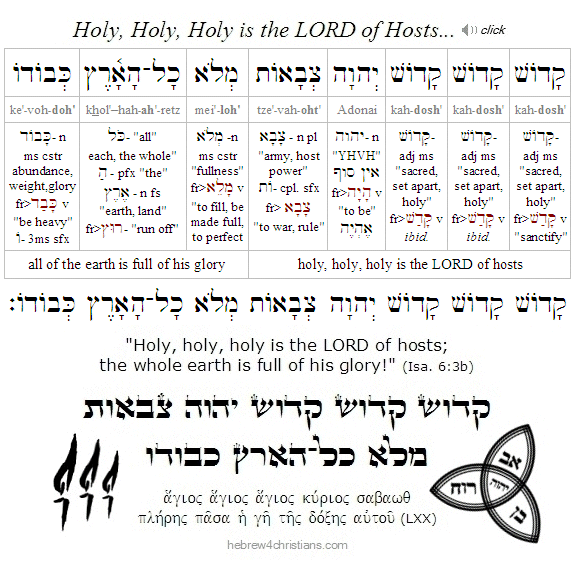 |
Tishah B'Av Prophecies...
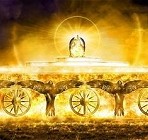
[ The following is related to the somber holiday of Tishah B'Av, which begins Monday, Aug. 12th at sunset and runs through the following day... ]
08.08.24 (Av 4, 5784) Yeshua foretold the destruction of the Second Temple when he lamented: "O Jerusalem, Jerusalem, the city that kills the prophets and stones those who are sent to it! How often would I have gathered your children together as a hen gathers her brood under her wings, and you were not willing! Behold, your house is left unto you desolate. For I tell you, you will not see me again, until you say, Barukh Haba Ba'shem Adonai: 'Blessed is he who comes in the name of the Lord.' Yeshua then left the Temple and was going away, when his disciples came to point out to him the buildings of the Temple. But he answered them, "You see all these, do you not? Truly, I say to you, there will not be left here one stone upon another that will not be thrown down." (Matt. 23:37-24:2).
Note that we are not awaiting the appearance of the "Third Temple" which will be hastily erected during the time of Jacob's Trouble during the Great Tribulation, but we await the "Fourth Temple," that is, the Temple that will be built by Tzemach Tzaddik (צֶמַח צַדִּיק), namely, Messiah the Son of David (מָשִׁיחַ בֶּן־דָוִד) who will come again to establish the Kingdom of Zion upon the earth in fulfillment of the promises of God (Zech. 6:12; Jer. 23:5). At that glorious time the mourning of the Jewish people will forgotten, as it is written: "Thus says Adonai Tzeva'ot (יהוה צְבָאוֹת): The fast of the fourth month (Tammuz), and the fast of the fifth month (Tishah B'Av), and the fast of the seventh month (Gedaliah), and the fast of the tenth month (Asarah b'Tevet), will be to the house of Judah for joy and rejoicing and for pleasant appointed seasons. Therefore love truth and peace" (Zech. 8:19). In that coming day, "the LORD will be king over all the earth. On that day the LORD will be one and his name one" (Zech. 14:9).
וְהָיָה יְהוָה לְמֶלֶךְ עַל־כָּל־הָאָ֑רֶץ
בַּיּוֹם הַהוּא יִהְיֶה יְהוָה אֶחָד וּשְׁמוֹ אֶחָד׃
ve·ha·yah · Adonai · le·me'·lekh · al-kol-ha·ah'·retz
bai·yohm · ha·hoo · yee·he·yeh · Adonai · e·chad · oo·she·moh · e·chad

"And the LORD will be king over all the earth.
On that day the LORD will be one and his name one."

Click to listen and learn the Hebrew text:
As I've mentioned over the years, the word "Zion" (i.e., tziyon: צִיּוֹן) is mentioned over 160 times in the Scriptures. That's more than the words faith, hope, love, and countless others... And since Zion is a poetic form of the word Jerusalem, the number of occurrences swells to nearly 1,000! It is therefore not an overstatement to say that God Himself is a Zionist.... "Out of Zion, the perfection of beauty, God shines forth" (Psalm 50:2). Zion represents the rule and reign of God in the earth and is therefore synonymous with the Kingdom of God. The entire redemptive plan of God -- including the coming of the Messiah Himself and our very salvation -- is wrapped up in the concept of Zion. It is the "historiography" of God -- His "philosophy of history," if you will.
The great vision of Zion is at the heart of the Gospel message and the focal point of God's salvation in this world. Zion represents our eschatological future -- our home in the world to come. Even the new heavens and earth will be called Jerusalem -- "Zion in her perfection" (Rev. 21). "This is what Adonai Tzeva'ot says: I am very jealous for Jerusalem and Zion, but I am very angry with the nations that feel secure" (Zech. 1:14-15). "For Zion's sake I will not keep silent, for Jerusalem's sake I will not remain quiet, till her righteousness shines out like the dawn, her salvation like a blazing torch" (Isa 62:1). "The builder of Jerusalem is God, the outcasts of Israel he will gather in... praise God, O Jerusalem, laud your God, O Zion" (Psalm 147:2-12).
It is worth noting that in the discussion from the Talmud, the 6,000 years of human history are divided into three epochs of 2,000 years each. The period of "tohu" occurred from the time of the fall of Adam until the call of Abraham; the period of "Torah" occurred from Abraham until the time of the destruction of the Second Temple, and the period of the "Messiah" refers to the time when the Messiah could appear before the Kingdom is established in Zion. The time immediately preceding the appearance of the Messiah will be a time of testing in which the world will undergo various forms of tribulation, called chevlei Mashiach (חֶבְלֵי הַמָּשִׁיחַ) - the "birth pangs of the Messiah" (Sanhedrin 98a; Ketubot, Bereshit Rabbah 42:4, Matt. 24:8). Some say the birth pangs are to last for 70 years, with the last 7 years being the most intense period of tribulation -- called the "Time of Jacob's Trouble" / עֵת־צָרָה הִיא לְיַעֲקב (Jer. 30:7). The climax of the "Great Tribulation" (צָרָה גְדוֹלָה) is called the great "Day of the LORD" (יוֹם־יהוה הַגָּדוֹל) which represents God's wrath poured out upon a rebellious world system. On this fateful day, the LORD will terribly shake the entire earth (Isa. 2:19) and worldwide catastrophes will occur. "For the great day of their wrath has come, and who can stand?" (Rev. 6:17). The prophet Malachi likewise says: "'Surely the day is coming; it will burn like a furnace. All the arrogant and every evildoer will be stubble, and that day that is coming will set them on fire,' says the LORD Almighty. 'Not a root or a branch will be left to them'" (Mal. 4:1). Only after the nations of the world have been judged will the Messianic kingdom (מַלְכוּת הָאֱלהִים) be established upon the earth. The remnant of Israel will be saved and the 1000 year reign of King Messiah will then commence (Rev. 20:4).
 |
The concept of the King Messiah, the "Anointed One" who would one day come to deliver his people from oppression at the beginning of an era of world peace has been the sustaining hope of the Jewish people for generations. King Messiah is the instrument by whom God's kingdom is to be established in Israel and in the world. This hope runs throughout the entire Tanakh. According to rabbinical Judaism (following Maimonides), this Messiah figure is not divine, though he certainly has divine powers and attributes. Indeed, he functions as Israel's Savior who would be empowered by God to:
- Restore the Kingdom of David (Jer. 23:5, Jer 30:9, Ezek. 34:23)
- Restore the Temple in Zion (Isa. 2:2, Micah 4:1, Zech. 6:13, Ezek. 37:26-28)
- Regather the exiles (Isa. 11:12, 43:5-6, 51:11)
- Offer the New Covenant to Israel (Jer. 31:31-34)
- Usher in world peace and the knowledge of the true God (Isa. 2:4; 11:9). This will include the entire world speaking Hebrew (Zeph. 3:9).
- "Swallow up" death and disease (Isa. 25:8)
- Raise the dead to new life (Isa. 26:19)
- Spread Torah knowledge of the God of Israel, which will unite humanity as one. As it says: "God will be King over all the world -- on that day, God will be One and His Name will be One" (Zech. 14:9)
According to this general framework of history, we are currently living in the "days of the Messiah," just before the time of great worldwide tribulation that will lead to the prophesied acharit hayamim (אַחֲרִית הַיָּמִים), or the "End of Days." This is the age in which the spirit of the Messiah is available to all. These are "days of God's favor" that are ending soon. According to traditional Jewish sources (Pesachim 54b; Midrash Tehilim 9:2), no one knows the exact time when the Messiah will appear -- though there are some hints. The condition of the world during the end of days will be grossly evil (2 Pet. 3:3; 2 Thess. 2:3-4, 2 Tim. 3:1-5). The world will undergo various forms of tribulation, collectively called chevlei Mashiach (חֶבְלֵי הַמָּשִׁיחַ) - the "birth pangs of the Messiah" (Sanhedrin 98a; Ketubot, Bereshit Rabbah 42:4, Matt. 24:8). Some sages say the birth pangs will last 70 years, with the last 7 years as the most intense period -- the "Time of Jacob's Trouble" / עֵת־צָרָה הִיא לְיַעֲקב (Jer. 30:7). Just before the arrival of Yeshua as Mashiach ben David, a period of tribulation and distress for Israel will occur. After this "great tribulation" period, however, Yeshua will usher in Yom YHVH, the "Day of the LORD," and the sabbatical millennium, the 1000 year reign of King Messiah will commence (Rev. 20:4).
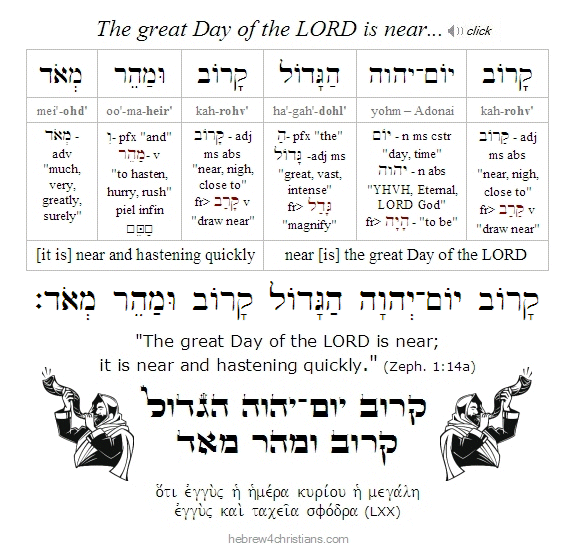 |
Although "Day of the LORD" (i.e., yom Adonai: יוֹם יְהוָה) is sometimes associated with Tishah B'Av and the catastrophic destruction of the Jewish Temple, the words of the prophets were only partially fulfilled, and there awaits another Day coming when God will terribly shake the entire earth (Isa. 2:19). "For the great day of their wrath has come, and who can stand?" (Rev. 6:17). The prophet Malachi likewise says: "'Surely the day is coming; it will burn like a furnace. All the arrogant and every evildoer will be stubble, and that day that is coming will set them on fire,' says the LORD Almighty. 'Not a root or a branch will be left to them'" (Mal. 4:1). For those who are godless, the great Day of the LORD is a time of horrific judgment, but for those who belong to the LORD, it represents a day of victory and great blessing. Regarding that day the prophet Malachi said, "Then you will trample down the wicked; they will be ashes under the soles of your feet on the day when I do these things" (Mal. 4:3).
Ultimately the Great Tribulation period is purgative and restorative for Israel (sometimes called yissurim shel ahavah, or "the troubles of love"). The prophets wrote that Zion will go through labor and then give birth to children (Isa. 66:8). Thus the Vilna Gaon wrote that the geulah (national redemption) is something like rebirth of the nation of Israel. This accords with the prophetic fulfillment of Yom Kippur as the Day of Judgment and time of Israel's national conversion. In the verse from prophet Jeremiah regarding the "Time of Jacob's Trouble," it's vital to see the goal in mind -- "yet out of it he is saved" (וּמִמֶּנָּה יִוָּשֵׁעַ). When Yeshua returns to Zion, all Israel will be saved (Rom. 11:26). The sages note that childbirth is a time of radical transition and struggle for the baby -- from the time of relatively peaceful existence within the womb into the harsh light of day -- and therefore a similar transition between this world and the Messianic world to come is about to take place... (For more click here.)
 |
The Voice of Our Words...

08.07.24 (Av 3, 5784) According to Jewish tradition, it was on Tishah B'Av (the ninth of Av) when the people wept over the report of the spies, a lapse of faith so serious that it provoked God to decree that the very generation He redeemed from Egypt would die in the exile of the desert (see Num. 13-14). As Moses later recounted this tragic event, he said something peculiar: "The LORD heard the 'voice of your words' (קוֹל דְבַרִים) and was angry..." (Deut. 1:34). The grammar here is unusual, for the text could have simply said, "the LORD heard your words," but the Torah adds something else, the idea of "emotional tone," or the manner, the words were spoken... Sometimes it is not so much what you say that matters, but how you say it. Words of the heart are expressed more by tone, the "voice of the words," than by the words themselves...
According to midrash when the spies returned after scouting the land, they said "the land is good" in a qualified or even an insincere manner. "Just look at this gigantic fruit we picked -- for gigantic people of that land who are invincible!" The words spoken by the spies were "true" in a sense, but their expression mediated a fearful attitude that rendered them untrue. Instead of saying "the land is good" - and affirming God's promise - their words were nuanced with doubt, and the "sound of their words" belied their testimony.
In themselves words are not "static" things but they live and move within a context to inform a common or shared sense of meaning. The grammar of "truth" assumes good will and correspondence between what is said and what is adjudged as real, "actual" or credible. When words are used deceptively, ambiguously, ironically, disingenuously, or without straightforward intent, however, then common sense does not obtain and the meaning shifts to "meta-linguistic" interpretation. With regard to God, however, the constellation of beliefs, assumptions, intent, and the emotional context is fully known whenever we communicate, as it is written: "There is not a word on my tongue but You, O LORD, know it altogether" (Psalm 139:4), and therefore He entirely understands our true intent -- or the "voice of our words."
In our Torah portion this week (i.e., Devarim) we read: "May he (i.e., the LORD) bless you as He said to you" - וִיבָרֵךְ אֶתְכֶם כַּאֲשֶׁר דִּבֶּר לָכֶם (Deut. 1:11), which the sages read as: "May he bless you as your speech is to you," suggesting that our language will mirror spiritual reality (Psalm 18:25-26; Prov. 23:7). And when we recite Shema, we do so bekhol levavkha (בְּכָל־לְבָבְךָ) - with all our heart, with all our soul, with all our might (Deut. 6:5). This is a cry from the heart that affirms God's truth. Our feelings are important and are meaningful, whether they are feelings of joy, gratitude, and so on, or feelings of doubt, despair, or fear. As Yeshua said: "Would that you were either cold or hot, but because you are lukewarm - neither hot nor cold - I will spew you out of my mouth" (Rev. 3:15-16).
It has been said that if you don't know how to say something, say it loudly... The heart has its own voice regardless of the words we are able to articulate. For instance, if you love someone, then really love them and abhor being halfhearted. Being hot or being cold is better then being tepid, because then you are being honest, you are speaking from the kishkas, and honesty will always evoke a genuine response from heaven...
Hebrew Lesson
Deuteronomy 1:34 reading (click):
Somber Time of Tishah B'Av...
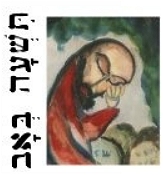
08.07.24 (Av 3, 5784) The sages of the Mishnah (Ta'anit 26) taught that five tragedies befell the Jewish people on Tishah B'Av (תשעה באב, or the "ninth [day] of [the month of] Av"). First, God's decree was issued that the generation that left Egypt during the Exodus would not enter the promised land (Num. 14:1-2; 14:23). Second, the First Temple was destroyed by Nebuchadnezzar II (נְבוּכַדְנֶאצַּר) in 586 BC according to prophecy (Jer. 27:6-8). Third, the second Temple was destroyed by the Romans in 70 AD, according to the prophecy of Yeshua (Matt. 24:1-2). Fourth, the last stronghold of the "Bar Kokhba" revolt was destroyed by Roman Emperor Hadrian in 135 AD, and fifth, the City of Jerusalem and the Temple Mount was "plowed under" exactly one year later (Jer. 26:18). Emperor Hadrian then sold all Jewish prisoners into slavery, forbade the teaching of the Torah, renamed the middle east "Palaestina," and dedicated the City of Jerusalem to the idol Jupiter as "Aelia Capitolina." Besides all this, other tragedies are also coincidental with Tishah B'Av, such as the expulsion of the Jews from England in 1290 and their expulsion from Spain in 1492. Some of the sages even date the beginning of WWI, when Germany declared war on Russia, to the Ninth of Av, and since WWI inevitably led to WWII, they also connect Tishah B'Av with the horrors of the Holocaust as well...
Because of all this Tishah B'Av is generally regarded as the saddest day of the Jewish year (even sadder than Yom Kippur), and the sages designated it as an annual day of mourning that recalls these many tragedies that have befallen the Jewish people over the centuries. It is a time for teshuvah, fasting, and special prayers. This year Tishah B'Av begins Monday, August 12th at sundown and runs 25 hours until Tuesday August 13th, one hour after sundown. The customs for observing the fast are similar to those of Yom Kippur.
It is customary to read Megillah Eicha (מגילה איכה), or the Book of Lamenations, during the Tishah B'Av evening service, since the scroll is an (acrostic) poem of lament prophetically written before the destruction of the First Temple. The scroll is chanted in a plaintive nusach (נוסח), as if lashon ha'kodesh, the holy tongue, weeps for the destruction of God's home.
Hebrew Lesson
Lamentations 2:13 reading (click for audio):
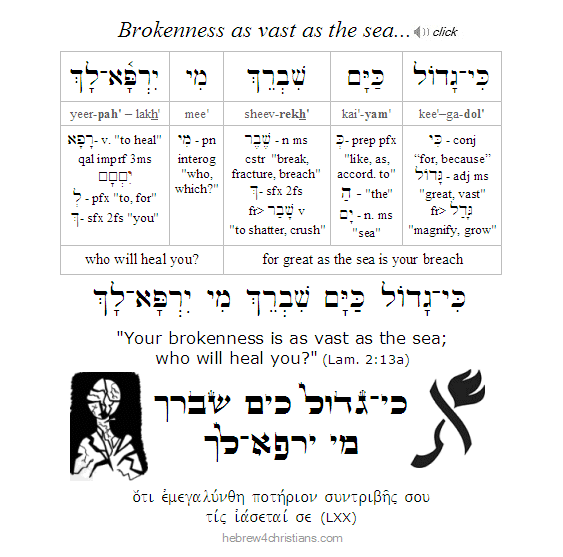 |
Tishah B'Av allows us to express heartfelt grief over the loss of Zion and therefore over the frailty of our human condition. During this time it is appropriate to grieve over our sins and to shed tears that attest to having lev nishbar ve'nidkeh (לֵב־נִשְׁבָּר וְנִדְכֶּה), a "broken and crushed heart" (Psalm 51:17). Indeed, during the entire "Three Weeks of Sorrow" we read selections from the prophets that forewarn of the coming destruction of the Temple (churban) and the subsequent exile of the Jewish people (galut). During this time of the year, we listen to the lamentations of the prophet Jeremiah crying out for our repentance...
During Tishah B'Av synagogue services, the lights are dimmed and the Aron Hakodesh (Holy Ark) is draped in black (in some synagogues the parochet (curtain) is removed as a sign of mourning). The decorations are removed from Torah scrolls. Congregants remove their leather shoes and do not greet each other. The cantor leads the prayers readings in a low, mournful voice, and the cantillation (chanting style) for the Scripture readings are set to elegiac, sorrowful melodies.
"Let everyone cry out to God and lift his heart up to him, as if he were hanging by a hair, and a tempest were raging to the very heart of heaven, and he were at a loss for what to do, and there were hardly time to cry out It is a time when no counsel, indeed, can help a man and he has no refuge save to remain in his loneliness and lift his eyes and his heart up to God, and cry out to him. And this should be done at all times, for in the world a man is in great danger." - Martin Buber (Ten Rungs)
Love and Reproof...

[ The following entry is related to our Torah portion this week, parashat Devarim... ]
08.06.24 (Av 2, 5784) Just before Moses began his reproof of Israel, he declared his love and faith in the people: "The LORD your God has multiplied you until you are today as numerous as the stars in the sky (כְּכוֹכְבֵי הַשָּׁמַיִם). May the LORD, the God of your fathers, make you a thousand times more as you are (כָּכֶם), and bless you, as He promised you" (Deut. 1:10-11). Moses first brought up God's great love for the Jewish people before he began his admonition. Notice he used the word kachem (כָּכֶם, "as you are") in this blessing. May the LORD multiply you - as you are - a thousand times! You are beloved; you are worthy: may the LORD bless you a thousand times over!
Were these people perfect then? Obviously not, as would be clear through Moses' later admonition to them. Nonetheless, Moses used a "good eye" to see their potential as God's chosen people. Here was this ragtag group of of desert wanderers, descendants of slaves from the "house of slavery," whom the LORD God Almighty personally redeemed to be His own treasured possession. Despite their failures in the past and all that went before, Moses reminded them that they were esteemed as mamlechet kohanim v'goy kadosh (מַמְלֶכֶת כּהֲנִים וְגוֹי קָדוֹש), a "kingdom of priests and a holy people" (Exod. 19:6).
Moses' approach gives insight about how we might attempt to correct the people we truly love. Often people become defensive when they are criticized and stop listening. Adding sincere praise and encouragement helps them open up to our message, since it is grounded in a sense of respect and value for their well-being. God thinks highly of the Jewish people, and that is the very first thing to be heard. God greatly esteems us, too. Despite the fact that we are sinners, God truly loves us. He considers us worthy to be saved. Again, why else did Yeshua suffer and die on the cross if God did not value our lives so much?
The essence of the law is mercy, and shame is never the goal of the Torah. As King David prayed: Elohai bekha vatachti; al-avoshah (אֱלהַי בְּךָ בָטַחְתִּי אַל־אֵבוֹשָׁה): "My God, I trust in you; let me not be ashamed" (Psalm 25:2). Some people use the idea of God's "law" as a sort of club to hammer a sense of guilt upon the soul. They insist that man is "totally depraved" and under God's death sentence. Such people then hope to explain the good news of the gospel to escape God's righteous wrath for sin. These people, perhaps well-meaning, forget that the LORD is "near" - karov- to the brokenhearted. This adverb means "close enough to touch." The same root is used for the word korban (קָרְבָּן), an offering that draws us near to God, as well as karov (קָרוֹב), a near kinsman. In other words, God's desire has always been for people to draw near to Him, and He has always provided a way for people to do so -- even those who lived under the terms of the Sinai Covenant.
Guilt (אַשְׁמָה) is an objective state of being sinful that may or may not be accompanied by feelings of remorse, but shame (בּוּשָׁה), at least in its toxic sense, is a state of soul that regards itself as fundamentally flawed, inadequate, and essentially unlovable. God does not want us to grovel in self-disgust or live in constant fear of His judgment. He does not want us to hate ourselves or to regard ourselves as unlovable. On the contrary, as His creation, He loves us and finds us of value and worth. Why else would he have given His Son up to ransom us from sin and death? Like a parent who loves his child but wants to correct him by saying, "this doesn't become you," so God wants us to remember who we really are. He wants us to "walk in love" as His "dear children of light" (Eph. 5:8). God's correction is meant to form His character within us, and this first must begin with our assurance of our value, dignity, and worth in His eyes.
We are commanded to judge with tzedakah, with love as our underlying assumption. If God so commands us, surely we can trust that He likewise judges us this way. God's love is his essence - "God is love" (ὁ θεὸς ἀγάπη ἐστίν) - and He regards you as worthy to receive His love and blessing. He loves you b'ahavat olam - with "an everlasting love" (אַהֲבַת עוֹלָם), and therefore in chesed he draws you to Himself (Jer. 31:3). Why else would Yeshua die on the cross unless He expressed God's desire to judge others favorably?
Be encouraged, chaverim. As God's personal creation, you are "fearfully and wonderfully made" and you have a future and a hope in the world to come (Jer. 29:11). "There is no fear in love, but perfect love casts out fear. For fear has to do with punishment, and whoever fears has not been perfected in love" (1 John 4:18). Keep hope. God's love never fails (1 Cor. 13:8).
Hebrew Lesson
Psalm 25:2 reading (click for audio):
Whispers of the Heart...
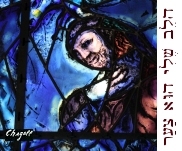
08.06.24 (Av 2, 5784) From our Torah portion this week (i.e., parashat Devarim) we read: "You were not willing to go up but rebelled (i.e., מָרָה, grew bitter) at the word of the LORD your God. And you whispered in your tents and said, 'Because the LORD hates us he has brought us out of the land of Egypt...'" (Deut. 1:26-27). We may decry the childish insolence of the people, we lament their lack of faith, and yet God was still speaking through Moses to Israel...
The sages ask whether we can ever be justifiably angry at God, and answer that we can, because otherwise we could never love Him "bekhol levavkha," with all our heart (Deut. 6:5). Indeed, how can we claim to love God if we withhold the truth, lie to ourselves, and attempt to hide who we really are from Him? If you are angry at God, he already knows, so why the pretense? Being angry with God is part of being a real person in a real relationship with Him, and allowing yourself to express the truth of your heart to him is a sign of trust...
Hebrew Lesson
Psalm 139:4 reading (click):
Rapture and Tribulation...
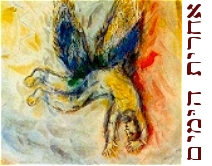
[ Israel is the "super sign" of God's faithfulness to the world... !עם ישראל חי ]
08.05.24 (Av 1, 5784) Chodesh Tov, chaverim. We read in Psalm 83 about the plight of Israel near the end of days: "O God, do not keep silence; do not hold your peace or be still, O God! For behold, your enemies make an uproar; those who hate you have raised their heads. They have taken crafty counsel against your people, and consulted together against your sheltered ones. They say, "Come, let us wipe them out as a nation; let the name of Israel be remembered no more" (Psalm 83:1-4). Note that the ancient names of the ten enemy nations listed in Psalm 83 correspond to modern day political states surrounding the State of Israel today....
With the brazen atrocities perpetrated by "Hamas" and "Hezbollah" on Simchat Torah, October 7, 2023, the "Psalm 83" war may be under way, as Israel is now fighting this coalition of enemy nations (on multiple fronts) that seek to destroy and uproot the Jewish people living in their ancient homeland. Note further that while this regional war with the coalition of the ten nations may serve as a prelude to the "Great Tribulation," it is not to be confused with the coming "Gog and Magog" war that will involve Iran (Persia), Turkey, Syria, and Russia, among others...
Nevertheless the "Israel-Hamas war" -- which includes militant factions in Gaza, Egypt, Lebanon, Syria, Jordan, Saudi Arabia, Yemen, Iran, among others - presents a significant sign that the "End of Days" (אחרית הימים) is indeed upon us. And with Russia in league with Iran and Syria, the world is at the cusp of the prophesied "Gog-Magog" War that will likely reveal the Messiah of evil ("Antichrist") and the beginning of Daniel's 70th Week. Before the Great Tribulation of plagues (i.e., the seven seals, trumpets, and bowls mentioned in the Book of Revelation) are released upon the world kingdoms at the end of the age, however, God's people will be "called up" to meet the Lord in the air, escaping from the wrath to come (1 Thess. 4:16-17; 5:9).
Near the end of the "Great Tribulation" period yet another war will be fomented - a last ditch effort for Satan to destroy Israel - wherein the nations of the world will be gathered together to engage in a final and climactic attempt to foil God's plans. This is sometimes called the "Battle of Armageddon" (i.e., הר מגידו, "the mount of Megiddo") that most people think of as the terminal war at "End of the World" (יום יהוה הגדול). However, Yeshua will appear with myriad of the tzaddikim and put a decisive end to the global mayhem. The Kingdom of Zion will then be inaugurated as Yeshua is recognized as the Sovereign LORD our Redeemer, the King and Savior of Israel. Every knee shall bow and every tongue shall confess that He is the LORD, the great King of Israel. The "Millennial Kingdom" will then be established and all the prophetic promises given to Israel will finally be fulfilled... Amen, בוא ה' ישוע - come Lord Yeshua!
Some people have taken issue with my suggestion that the Israel-Hamas War may "portend" the imminent rapture of Yeshua's followers, and while I agree that this conflict may not escalate to World War III, and so on, I am nevertheless confident that followers of Yeshua will not go through "the Great Tribulation" (הַצָּרָה הַגְּדוֹלָה) but will escape from the wrath of God. That is not to say that we will not see increasing forms of "tribulation" in the earth during the time leading up to end of days, "birth pangs of Messiah" (חֶבְלֵי מָשִׁיחַ), but Israel will undergo the "time of Jacob's trouble" (עֵת־צָרָה לְיַעֲקֹב) and God will intervene to save and vindicate his people. This view is sometimes called "pretribulationalism" (as opposed to "mid- or post-tribulationalism) because it believes that the "church" will not go through the time of God's wrath upon the earth, just as Israel was divinely sheltered in Goshen during the time of the plagues of Egypt, and just as Noah was spared from going through the time of the great flood that overwhelmed the world.
The "pretribulational" hermeneutic (i.e., interpretative filter) has its place in the discussion of eschatology because it makes sense of Daniel's prophecies of the 70 weeks (Dan. 9:20-27), and it fits well with other prophetic teachings from the New Testament, including Yeshua's distinction between the "Second Coming" at the end of the age and his promise to his followers that he was going to prepare a place for them and then come for them (cp. Matt 24 with John 14-17; Isa. 26:20). The last days of Israel and the last days of the "church" simply do not match. Moreover, Paul's teaching to Thessalonians (see 1 Thess. 4:13-5:11) further indicates a distinction between being "snatched away to the clouds" (ἁρπαγησόμεθα ἐν νεφέλαις) "to meet the Lord in the air" and the Second Coming of Messiah and the End of the World. In this passage Paul sought to comfort those who thought they were about to experience the "Day of the LORD" and the wrath of the Great Tribulation to come, but Paul assured them otherwise.
In this connection it is also noteworthy that the "church" (i.e., ἐκκλησία) is no longer mentioned as being on the earth in the Book of Revelation following chapter 4 -- a strange and obvious omission, especially when we consider many other New Testament Scriptures that warn believers against ungodly living, to be on guard for false teaching, and to endure persecution, but they are silent about the preparing for the great judgment (wrath) that will befall the world.
Moreover, the pre-tribulation rapture doctrine coheres with the Torah's mo'edim (holiday schedule), with allusions given in Yom Teruah, Yom Kippur, Sukkot (fall harvest) and even in the holiday of Shavuot (spring harvest). The seven days of "sheva berachot" connected with a Jewish wedding, the "Bema" judgment of believers, etc., all are things set apart from the idea of the Second Coming and the establishment of Zion in the earth...
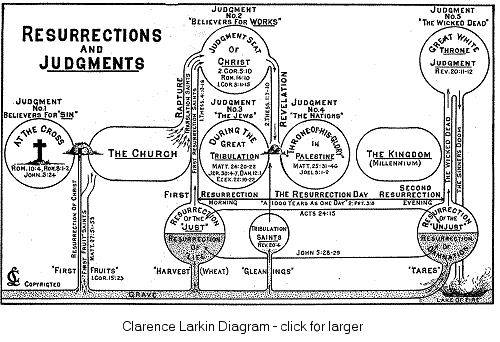 |
I do not have time to fully expound all this here, and people may disagree about the details of the last seven years of history before the Second Coming, but it is certain that the homeland promised to the children of Israel by the LORD God Almighty is presently surrounded by numerous regional enemies that are identifiable through Torah study (e.g., Philistines/Gaza, Ammon/Jordan, Ishmael/Saudi Arabia, etc.), and that this political situation undoubtedly adumbrates the "end of the age" and the lead up to the Great Tribulation period itself. Yeshua clearly taught this and urged us to know the "times and the seasons" outlined in his teaching.
Though no one knows the day or hour of the return of Yeshua our Messiah (see Matt. 24:36; Acts 1:7), there are clues given in Scripture about the conditions of the world before His return, and Yeshua himself gave us parables admonishing us to actively be looking (Matt. 24:2-14; 25:1-13). The Apostle Paul said that followers of the Lord can know the "season" of Messiah's return, and warned that He will come "as a thief in the night" - not in the revelation of great power and glory at the end of the age (1 Thess. 5:2-6). Moreover, Paul forewarned of the rise of worldwide godlessness (2 Tim. 3:1-7) and even of the flagrant apostasy of the "institutionalized" church (1 Tim. 4:1-3), which is of course evident today... Other Scriptures foretell of the coming One World Government, the rise of the Messiah of evil (Antichrist) whose "god" will be the "security state" (Dan. 11:38), the persecution of the national Israel (a nation miraculously restored to the promised land), the rebuilding of the Temple, the coming Great Tribulation, and so on. "When these things begin to take place, straighten up and lift up your heads, because your redemption is drawing near" (Luke 21:28).
Regarding the "world system," however, we have quite a different vision... The LORD God Almighty has vowed to break the pride of the "kings of the earth" with a rod of iron and dash them in pieces like a potter's vessel, and the shattering will be so ruthless that among its fragments not a shard will be found with which to take fire from the hearth, or to dip up water out of the cistern (Psalm 2:9; Isa. 30:14). For from His mouth comes a sharp sword with which to strike down the nations, and He will rule them with a rod of iron. He will tread the winepress of the fury of the wrath of God the Almighty (Rev. 19:15). Nebuchadnezzar's great dream will soon be fulfilled: "As you looked, a Stone was cut out by no human hand, and it struck the image on its feet of iron and clay, breaking them in pieces. Then the iron, the clay, the bronze, the silver, and the gold, all together were broken in pieces, and became like the chaff of the summer threshing floors; and the wind carried them away, so that not a trace of them could be found. But the stone that struck the image became a great mountain and filled the whole earth" (Dan. 2:34-35). "And the God of heaven will set up a kingdom that shall never be destroyed ... and it shall stand forever" (Dan. 2:44). One day the edifice of man's godless pride will come crashing down, and there will be no trace left of its rubble...
Yeshua told his followers: "Let not your heart be troubled: you believe in God, believe also in me. In my Father's house are many mansions: if it were not so, I would have told you. I go to prepare a place for you. And if I go and prepare a place for you, I will come again, and receive you unto myself; that where I am, there ye may be also" (John 14:1-3).
This alludes to the prophecy given in Isaiah, "Your dead shall live; together with my dead body they shall arise. Awake and sing, you who dwell in dust; for your dew is like the dew of herbs, and the earth shall cast out the dead. For behold, the LORD comes out of his place to punish the inhabitants of the earth for their iniquity; the earth will also disclose her blood, and will no more cover her slain" (Isa. 26:19-20).
Note the parallels here. Yeshua said he was preparing a "secret place of refuge" for his followers while the great "indignation" or Great Tribulation (הַצָּרָה הַגְּדוֹלָה) would befall the devil's reign within the world system. Indeed, he told us that after he was done preparing this secret place he would come and take us away to celebrate God's sheltering love during this momentous time -- and that is what the "rapture" is all about! Amen, maranatha Yeshua!
Hebrew Lesson
Psalm 91:1 Hebrew reading (click):
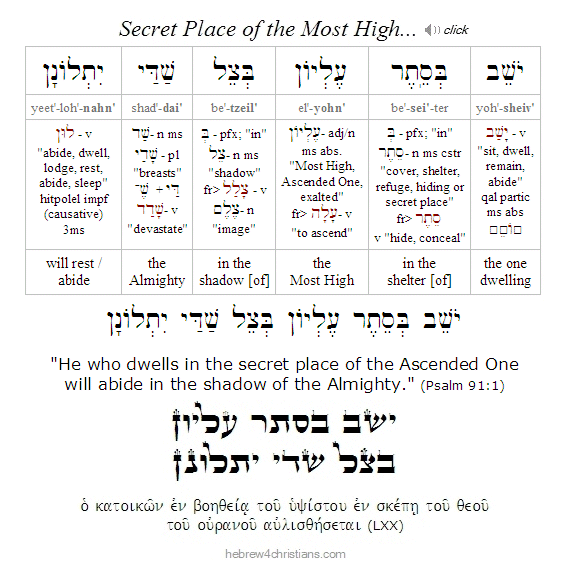 |
Addendum: I have friends who are mid-tribulational, or "pre-wrath," and some who are even post-tribulational (yikes), and I have discussed the issues with "preterists" who believe that the prophesied "End of Days" has already occurred, etc. (they skip over Yeshua's teaching about the Great Tribulation and think the only thing left is the eternal bliss and glories of heaven that awaits all who believe). I have only met some "amillenialists" while in college, though its viewpoint denies the promised Millennial Kingdom -- and it therefore implies that God has failed Israel. "Historic Premillenialism," however, is a mixed bag, since its draws its thinking from replacement theology and anti-Israel theology. Let us follow the rule of mercy as St. Augustine once stated: "In essentials, unity; in non-essentials, liberty; in all things, charity."
The Entreaty of Moses...
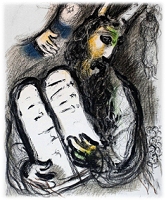
[ The following entry is related to our Torah portion this week, parashat Devarim... ]
08.05.24 (Av 1, 5784) Various commentators regard Sefer Devarim (i.e., the Book of Deuteronomy) as Moses' final warning to Israel in light of their repeated failures and setbacks. Some (primarily Christian) commentators even go so far as to say that the book represents an indictment against the Jewish people that warrants regarding them as a God-forsaken people. (This is essentially the repugnant doctrine of "replacement theology" that denies ethnic Israel has a future and a hope in God's plan of salvation.) Even many Jewish commentators, among them Rashi, seem to focus on Moses' rebuke (i.e., tochachah: תּוֹכָחָה) of Israel and regard the book in a negative light. Because of this, it should be stressed at the outset that Moses' correction of Israel - including his review of the unseemly history of the desert generation - was primarily intended to remind the Jews of their high calling, their new identity, and their preciousness as God's people. As will be seen, Moses wanted the people of Israel to remember their identity as am segulah (עַם סְגֻלָּה), God's "treasured possession among all peoples" (Exod. 19:5). Moses' admonition (מוּסָר) functions more like the plea of a father to his children to walk in a manner that is worthy of his name than a stinging rebuke of the sins of his children. "My son, despise not the discipline (musar) of the Lord; neither be weary of his correction (tochachah). For whom the Lord loves he corrects; even as a father the son in whom he delights" (Prov. 3:11; cp. Heb. 12:5-6). Therefore we read, "Know then in your heart that as a man disciplines his son (כַּאֲשֶׁר יְיַסֵּר אִישׁ אֶת־בְּנוֹ), the LORD your God disciplines you (הוה אֱלהֶיךָ מְיַסְּרֶךָּ)" (Deut. 8:5).
To underscore this point, notice that just before Moses began his reproof of Israel, he declared his love and faith in the people. "The LORD your God has multiplied you until you are today as numerous as the stars in the sky (כְּכוֹכְבֵי הַשָּׁמַיִם). May the LORD, the God of your fathers, make you a thousand times more as you are (כָּכֶם), and bless you, as He promised you" (Deut. 1:10-11). Moses first brought up God's love for the Jews before he began his admonition. Notice he used the word kachem (כָּכֶם, "as you are") in this blessing. May the LORD multiply you - as you are - a thousand times! You are beloved; you are worthy: may the LORD bless you a thousand times over! (How different is this picture of Moses than the typical cartoon made of him by many who envision him smashing the tablets as if that were his "last word" on the subject of the Torah to Israel!)
Were the people perfect then? Obviously not, as would be clear through Moses' later admonition to them. Nonetheless, Moses used a "good eye" to see their potential as God's chosen people. Here was this ragtag group of desert wanderers, descendants of slaves from the "house of slavery," whom the LORD God Almighty personally redeemed to be His own treasured possession. Despite their failures in the past and all that went before, Moses reminded them that they were esteemed as mamlechet kohanim ve'goy kadosh (מַמְלֶכֶת כּהֲנִים וְגוֹי קָדוֹש), a "kingdom of priests and a holy people" (Exod. 19:6).
Hebrew Lesson
Psalm 94:12 Hebrew reading (click):
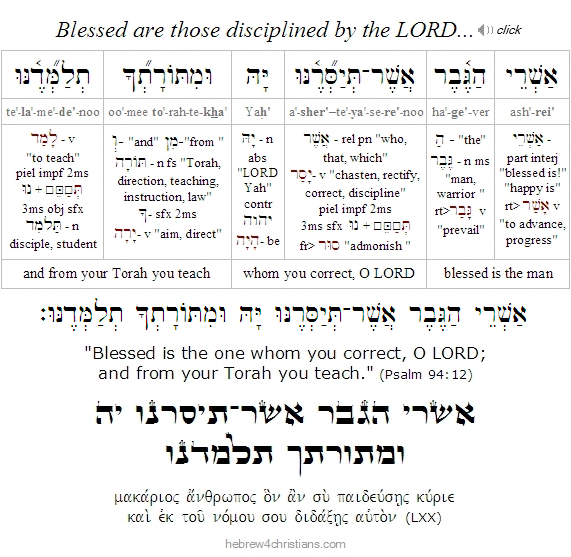 |
He Carries us Through...
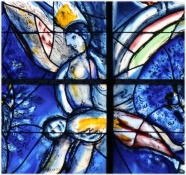
[ The following entry is related to our Torah portion this week, parashat Devarim... ]
08.05.24 (Av 1, 5784) Chodesh Tov Av, chaverim. From our Torah this week (Devarim) we read: "The LORD your God carried you, as a man carries his son, all the way that you went until you came to this place" (Deut. 1:31). Part of the miracle of faith is coming to believe that you matter to God – that you are his child, and that your thoughts, words, and deeds all are of his concern.
You may be tempted to regard yourself as unseen and powerless before the Creator of the universe. How is it possible for anyone to serve the Infinite One, since "even the heavens, and the heaven of heavens, cannot sustain You" (1 Kings 8:27)? Are we not made of clay, whose foundation is but dust? (Job 4:19).
Here the miracle of faith believes that God, the LORD and Source of all life, seeks relationship with you, and that He makes place within Himself to hear you, to engage your life, and to walk with you... Indeed, "the Word was made flesh and dwelt among us:" God emptied himself (κενόω) and clothed himself with human dust so that we could be touched by His love. The LORD carries us through our exile so that we might know and trust him...
Hebrew Lesson
Isaiah 46:4b reading (click):
"And just as we have borne the image of the man of dust,
so we shall also bear the image of the man of heaven" (1 Cor. 15:49).
Shavuah Tov Podcast:
Parashat Devarim...

08.04.24 (Tammuz 29, 5784) Our Torah reading this week (i.e., parashat Devarim) is the very first portion from the Book of Deuteronomy (ספר דברים), which is always read on the Sabbath that precedes the solemn and somber holiday of Tishah B'Av (תשעה באב). In Jewish tradition, this Sabbath is called "Shabbat Chazon" (שַׁבַּת חַזוֹן), "the Sabbath of Vision," since the Haftarah that is read (i.e., Isa. 1:1-25) comes from the vision of the prophet Isaiah regarding the destruction of the Holy Temple in Jerusalem. In both Jewish tradition and liturgy, teshuvah (repentance) and confession of sin are the themes of this prepatory Sabbath.
Hebrew Lesson
Isaiah 1:9 reading (click):
Parashat Devarim:
The Summary Book of Torah...

[ "Reviewing a lesson a hundred times cannot be compared with reviewing it a hundred and one times." - Hillel the Elder ]
08.04.24 (Tammuz 29, 5784) Shavuah tov v'chodesh tov, friends. The concluding book of the Torah of Moses is called "Devarim" (i.e., דברים, "words" or "things"), from the phrase eleh ha'devarim ("these are the words...") found in its opening verse. In our English Bibles, Sefer Devarim (ספר דברים) is known as the "Book of Deuteronomy," from a Greek word meaning "second (or repeated) law" (δευτερονόμιον), a term used to translate the phrase mishneh ha-Torah ("copy of the Torah," Deut. 17:18).
Generally speaking, the Book of Devarim represents Moses' "farewell address" to Israel, where he reviews and summarizes the history and the laws given to the people and repeatedly warns that obedience will bring blessing while disobedience will bring disaster. The series of personal discourses (or sermons) in the book all have the pleading tone of rebuke and admonition, and indeed some sages say it resembles a sort of "deathbed blessing" not unlike Jacob's blessing given to his sons.
Our Torah portion (i.e., parashah: פרשה) for this week is the very first section of the Book of Deuteronomy, which begins with Moses recounting the journey from Mount Sinai to the edge of the promised land. Moses mentioned the difficulty of personally governing the people and recalled how he set up a system of judges to help him administer justice among the various tribes. Moses then reminded the people of the tragic sin of the spies and the rebellion of the people at Kadesh Barnea, which led to God's decree that no one of that generation would live to enter the land of Canaan (except for Caleb and Joshua). Moses then provided an outline of the 38 year exile of the Israelites back toward the Sea of Reeds, into the desert regions, and then back again until the subsequent generation was ready to enter the promised land. For more information, see the links listed below.
In Your Father's Arms...
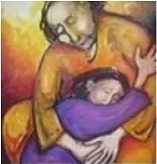
[ "God be praised that it is not because of my worthiness that God loves me; otherwise, I might at any moment die of fear lest the next moment I cease to be worthy." - Kierkegaard, Journals ]
08.02.24 (Tammuz 27, 5784) "Now I lay me down to sleep, I pray the Lord my soul to keep..." After praying with my youngest son Emanuel before he goes to bed, and just after we have said our closing "amens," a moment of silence sets in and he often asks me to pray again so that he won't have scary dreams or be afraid. So we pray some more, asking the Lord to deliver him from his fears and to put "shields of his protection" all around him as he sleeps. And I think to myself, and isn't this what we are praying much of the time, after all -- not to be afraid? And not to be angry, which really is the same thing...
We may sometimes feel uneasy over our lives; we may wrestle with "inner demons" that lurk in the shadows of consciousness and seek refuge from them; we may feel fragile, powerless, stupefied, sad, guilty, remorseful, fearful, insecure, lonely... We call out to the Lord for his protection and deliverance. We need reassurance that He is there for us, that he's on the other end of our heart's cry, that he cares. But surely our deepest fear is that of ourselves - our own inner darkness - and whether we will be able to hold it together and not destroy ourselves. As Yeshua said, "If the light that is in you is darkness, how great is that darkness!" (Matt. 6:23).
Our faith in God's love must be greater than the fear of our inner darkness -- those parts of ourselves that hide in the shadows. It is not simply trusting God to protect you from external evil but trusting God to deliver you from yourself - trusting him to heal you in the unconscious depths of your soul - that is the wound that evokes the raw cry of the heart. And more than that, our prayers are a cry for our Abba to be there for us, to take us up in his arms, to have him shush away our fears and say to us: "I love you; I am here with you..." Be at peace my beloved child.
Shabbat shalom and chodesh tov, chaverim.
Hebrew Lesson
Isaiah 41:13 reading (click for audio):
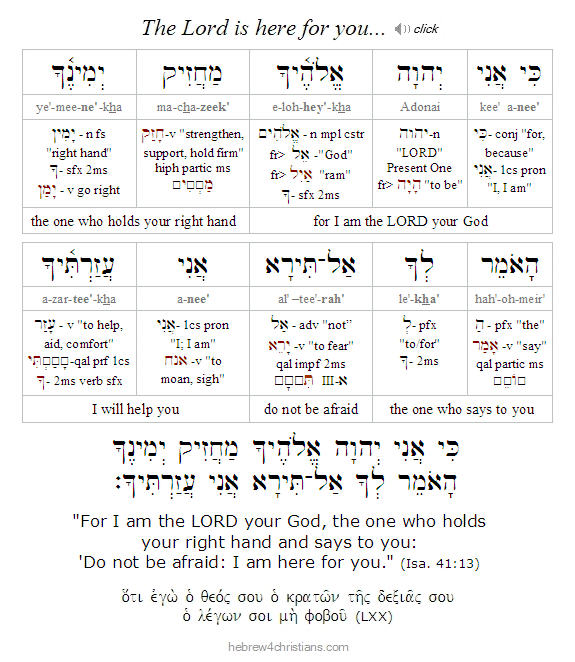 |
Words of the Heart...

08.02.24 (Tammuz 27, 5784) During his lectures on Jewish values, Joseph Telushkin used to ask his audience if they can go 24 hours without saying any unkind words about, or to, anybody. Most people said no, they couldn't. Rabbi Telushkin then commended them for their honesty, but then pointed out that if he had asked them if they could go 24 hours without drinking alcohol and they likewise said they couldn't, wouldn't that mean they have a serious drinking problem? (Words that Hurt). His point is that if you can't go 24 hours without saying unkind words about others (or raging at the world), you have lost control of your tongue.
Yeshua said words express the condition of the heart, since "from the abundance of the heart the mouth speaks" (Luke 6:45). Therefore the root issue concerns the heart (לֵב), the "midst of the self" that wills, desires, and chooses how to interpret and describe the world. If we choose to see from a heart of fear, we will tend to use our words as a weapon; but if we see with a heart of faith, we will extend compassion and seek to build others up....
In the Book of Proverbs we read, "In the abundance of words transgression is not lacking: but whoever restrains his lips is wise" (Prov. 10:19). The Chofetz Chaim comments: "When people are preparing a telegram, notice how carefully they consider each word before they put it down. That is how careful we must be when we speak." As James admonishes us: "Let every person be quick to hear, slow to speak, slow to anger, for the anger of man does not produce the righteousness of God" (James 1:19-20). Amen, "Let the words of my mouth, and the meditation of my heart be acceptable in thy sight, O LORD, my Strength and my Redeemer" (Psalm 19:14).
Hebrew Lesson:
Proverbs 10:19 reading (click):
Since our words represent our thoughts, the use of our tongues has to do with how we choose to think... "Think on these things..." We are instructed to "take every thought captive" (αἰχμαλωτίζω, i.e., lead away as a prisoner) to the obedience of Messiah... It is wise to restrain our speech, because, after all, we often have no idea what we are talking about, and therefore our words can become unruly and even dangerous. Whenever we open our mouth to speak, Heaven is listening (see Matt. 12:36-37).
Through a Glass Darkly...

[ "At every person's birth, there comes into an existence an eternal purpose for that person, for that person in particular. Faithfulness to oneself with respect to this is the highest thing a person can do. Indeed, it is a crime against heaven to disown your own heart." - Kierkegaard ]
08.02.24 (Tammuz 27, 5784) "We walk by faith, not by sight" - by hearing the Word of God, heeding what the Spirit of God is saying to the heart (2 Cor. 5:7; Rom. 10:17 )... For now we "see through a glass darkly" (1 Cor. 13:12) which literally means "in a riddle" (ἐν αἰνίγματι). A riddle is an analogy given through some resemblance to the truth, though quite often the correspondences are puzzling and obscure. Hence, "seeing through a glass darkly" means perceiving obliquely, looking "through" something else instead of directly apprehending reality.
We see only a reflection of reality, and our knowledge in this life is indirect and imperfect. This is contrasted with the "face to face" (פָּנִים אֶל־פָּנִים) vision and clarity given in the world to come, when our knowledge will be clear and distinct, and the truth of God will be fully manifest and no longer hidden. Being "face to face" with reality means being free of the riddles, the analogies, the semblances, etc., which at best adumbrate our way.. Such reflection should make us humble whenever we share our faith. "Now we know in part, but then shall we know in whole" (1 Cor. 13:12). An honest theology must find a place for mystery, for "seeing through a glass darkly," and for the apprehension of awe and wonder.
Since God is the Infinite One (אֵין סוֹף) whose understanding is without limit (Psalm 147:5), we must use analogies, metaphors, symbols, allusions, parables, figures of speech, poetry, and other linguistic devices to convey spiritual truth and meaning. We compare (συγκρίνω) spiritual things with spiritual (see 1 Cor. 2:13). Some mystics have said the way to God is through the transcendence of words altogether, though most use imagery and poetry about "ineffable" reality. Others, like Soren Kierkegaard, use "indirect communication" to evoke the decision to believe, to find hope, and to walk by faith.
Yeshua regularly used parables and stories to communicate deeper truths about ultimate reality. He likened the human heart to "soil" into which the Heavenly Farmer plants seed; he wanted his followers to know God as their "heavenly Father," the idealization of family love, and so on. Often he was surprised at how dull his own disciples were regarding his use of spiritual analogies (Matt. 15:16, 16:9-11; Mark 8:17; John 6:22-66). Furthermore Yeshua often taught in parables because they simultaneously conceal and reveal the truth. A parable obscures the truth to those who don't really want it; just as it reveals the truth to those who do (Luke 8:9-10). Since Yeshua's whole life was a parable of sorts - a "disguise" that led to the victory of our deliverance (Phil. 2:7) - it is not surprising that he regularly used "figures of speech" to provoke people to examine their own heart attitude and faith...
In this connection note that Yeshua never explained the "mysteries of the kingdom of God" (סודות מלכות אלוהים) directly to the crowds, nor did He ever pander to the crowd's clamor or interests. His message is always meant for the individual soul who was willing to follow Him -- to the one who had "ears to hear." Yeshua will forever be the Face of God to us, our Mediator and Savior, blessed be He (2 Cor. 3:18).
Just as there are hundreds of Names of God revealed in Scripture, so there are many analogies (or stories) given to help us understand His heart. For instance, God is likened to a farmer, a shepherd, a caring neighbor, a tenant, a king, an impartial judge, a pottery maker, an investor, an employer, a jilted husband, a passionate lover, and so on. However, the analogy Jesus used the most was that God is our Father, and we are His children. As it is written in the Psalms, "Like a father pities his children, so the LORD pities those who fear Him" (Psalm 103:13). The most intimate Name of God is simply Abba (אבּא), a term of endearment for a child uses for his father. For those who can believe, the eyes of the LORD are like those of a loving father who greatly rejoices over the presence of his child.
Hebrew Lesson
Deuteronomy 29:29 reading (click):
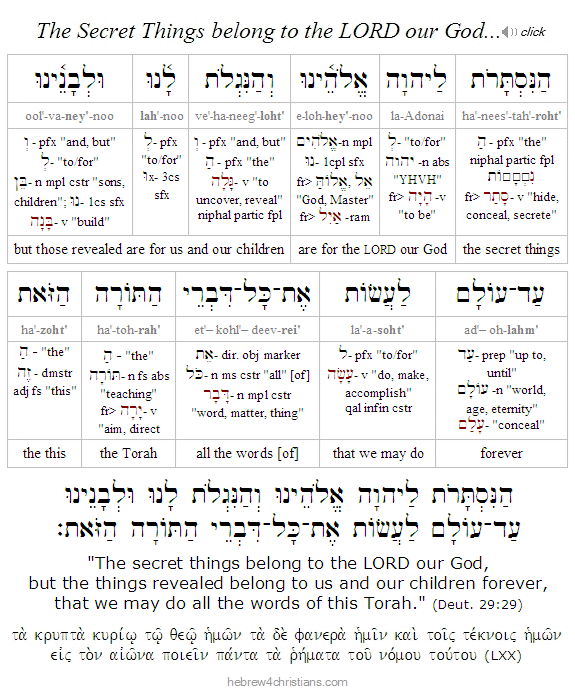 |
The Journey of Journeys...
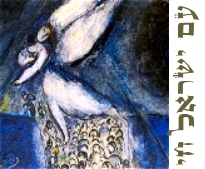
[ Faith believes that God is on the other side of our sighs and hopes, listening in compassion... ]
08.01.24 (Tammuz 26, 5784) From our Torah portion for this week (i.e., parashat Masei) we read: "These are the journeys of the people of Israel (מַסְעֵי בְנֵי־יִשְׂרָאֵל) who went out of the land of Egypt..." (Num. 33:1). The sages ask why the word "journeys" (plural) was used here, since only the first journey – from Rameses to Sukkot – literally marked "yetziat mitzrayim," the going out of Egypt – and all the other journeys were outside of Egypt, into desert regions. They answer that the journey out of Egypt goes beyond the physical land into the spiritual - an exodus from captivity to the world into the realm of the spirit. As has been said, it took the LORD 40 days to get Israel out of Egypt, but it took 40 years to get Egypt out of Israel... The "journey out of Egypt" is therefore a journey of smaller journeys that leads to the awareness of deliverance.
Along the way we are repeatedly tested. The "desert experience" reveals what is hidden in our hearts... The murmuring and rebellion of the Israelites in the desert is our own, and our challenge is to find healing from our fears. Anger, doubt, boredom, cravings, and outright rebellion are symptoms of a deeper problem, and to change we must first confess our inner poverty, neediness, and emptiness (James 5:16). When we stop making excuses we can learn to trust in God's provision for our lives; we will taste of the heavenly manna and be satisfied; we will be delivered from our fears by be filled with God's love. The impulses that sought to lead us away from God will no longer be able to pretend to be the truth, since God's peace and love will direct the heart. We will begin to take hold of the promise...
Be encouraged my fellow sojourners walking by faith through the desert of this present world. The Torah uses a repetitious expression, "Sanctify yourselves and you shall be holy" (הִתְקַדִּשְׁתֶּם וִהְיִיתֶם קְדשִׁים) (Lev. 11:44) because when we make a sincere effort -- no matter how feeble at times -- to draw near to the LORD, He will draw near to us (Zech. 1:3; James 4:8; Psalm 145:18). Indeed the walk of faith is one of ascent and descent and ascent again: It's often "two steps forward, one step back..." It is a long road, a process, as we learn to obey and seek to grow closer to God. Authentic repentance doesn't imply that we will never sin or make any mistakes, of course, but rather means that the oscillating pattern of "up, then down, then up" is the basic way we walk. Our direction has changed for good; we have turned to God for life and hope. We now understand our sins in light of a greater love that bears them for us even as we draw ever closer to the One who calls us home...
Hebrew Lesson:
Zechariah 1:3 Hebrew reading (click):
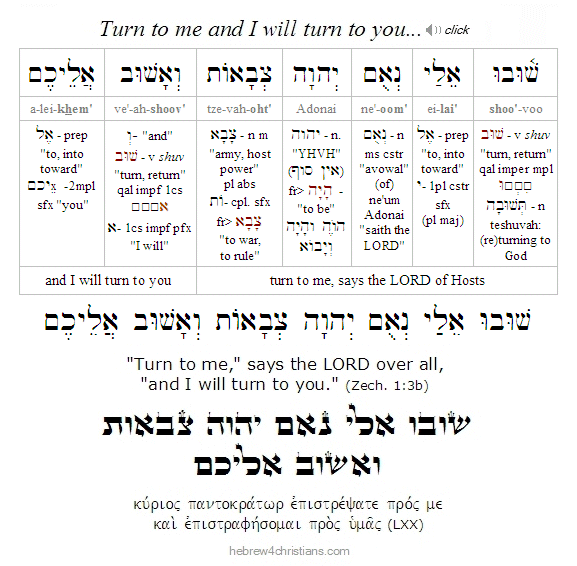 |
"I may live for thirty years, or perhaps forty, or maybe just one day: therefore I have resolved to use this day, or whatever I have to say in these thirty years or whatever I have to say this one day I may have to live — I have resolved to use it in such a way that if not one day in my whole past life has been used well, this one by the help of God will be." - Kierkegaard (Journals)
Seeing the Invisible...
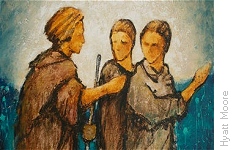
[ In this age we catch only "glimpses" of God as we walk by faith, not by sight. Faith allows us "see" past the scrim of this world but for a moment. "For now we see through a glass darkly..." There awaits for us, however, just beyond the veil, the substance of our hope, and then we will behold His glory "face to face..." ]
08.01.24 (Tammuz 26, 5784) Two men walked along the "road to Emmaus" from Jerusalem after hearing about the empty tomb of Yeshua. Apparently these two men, named Cleopas and Simon, associated with the disciples of Yeshua and knew Mary Magdalene, Salome, and Mary the mother of James, as well Peter and John (Luke 24:22-24). However, for unknown reasons they had left from Jerusalem, perhaps to return to their home town after the Passover pilgrimage. While they were Jewish believers in the Lord, they struggled to make sense of what happened to Yeshua and why he was crucified...
"Now while they were talking and reasoning together, Yeshua himself drew near and went with them. But their eyes were restrained, so that they did not recognize him" (Luke 24:15-16). Their eyes were "restrained," the Greek verb indicates that they were withheld or prevented from seeing. This recalls how Mary Magdalene looked on and failed to recognize Yeshua at the empty tomb, supposing him to be a gardener instead (John 20:24-25).
Soren Kierkegaard comments that the Savior walks unseen on the way with us, as he did with these two sad people, but we are often unaware of his presence. "We wish, sigh, and are occupied, yet just as we can tell the time by observing the shadows our bodies cast, so we can tell a person's maturity by how near he thinks the highest is to him." Despite this, Yeshua's first post-resurrection revelation would come to these two unsuspecting men.
It's not as if Yeshua had not foretold of his death, burial, and resurrection before, but his message was somehow lost to the disciples and they could not seem to fathom its importance. Their eyes were likewise "restrained" (Matt. 16:21; Matt. 17:22-23; Mark 10:32-34, Luke 24:6-7). Nevertheless, Yeshua took the time to contextualize his mission with them: "And beginning at Moses and all the Prophets, he expounded to them in all the Scriptures the things concerning himself" (Luke 24:27). Still they were full of questions, their heads spinning over what they were being told. As they drew near to the village where they were going, Yeshua acted as though he wanted to go further. But they urged him, saying, "Abide with us, for it is toward evening, and the day is far spent." So he went in to stay with them (Luke 24:28-29). They felt lost; they couldn't keep up with what was being said, but the Lord was patient with them.
After awhile, as he was sitting at the table with them, Yeshua took bread, blessed and broke it, and gave it to them. And then came the great moment. Their eyes were suddenly "opened" and they recognized him; and he vanished from their sight (Luke 24:30-31). He "vanished" because he did not wish to be known directly at this time (1 Cor. 13:12). He "hides" so that we may learn to seek Him. It is faith that sees, the "eyes of the heart" that recognize the miracle of God's grace revealed in Yeshua. This is the season wherein we "walk by faith, not by sight" (2 Cor. 5:7); there is a coming day when all will finally be revealed (Rev. 1:7).
But what did these two men recognize? What did they see? What did they learn? Was it not that Yeshua embodies the words of Moses and the Prophets, and the Psalms, as he later reaffirmed to the other disciples who likewise had their minds opened so they could understand the Scriptures (see Luke 24:44-45)? Yeshua is the Lamb of God, the heart and center of divine revelation. "Then their eyes were opened" and they saw his brokenness, his wounds, his sacrificial death as the great "Passover of the LORD" given on our behalf. Their eyes were opened when they saw Yeshua lifted up upon the cross, the place where all people are drawn to God (John 3:14:-15; John 12:32).
The walk of faith is one of "unseen hope," even though our Lord is always close (Deut. 30:14). It was "toward the evening," with the day far spent, in the later hours that the glimpse was given, when the heart of faith finally recognizes that God has walked by his side all through the days of life. "What will death be like?" they asked the teacher. "It will be as if a veil is ripped apart and you will say in wonder, "So it was you all along!" (De Mello).
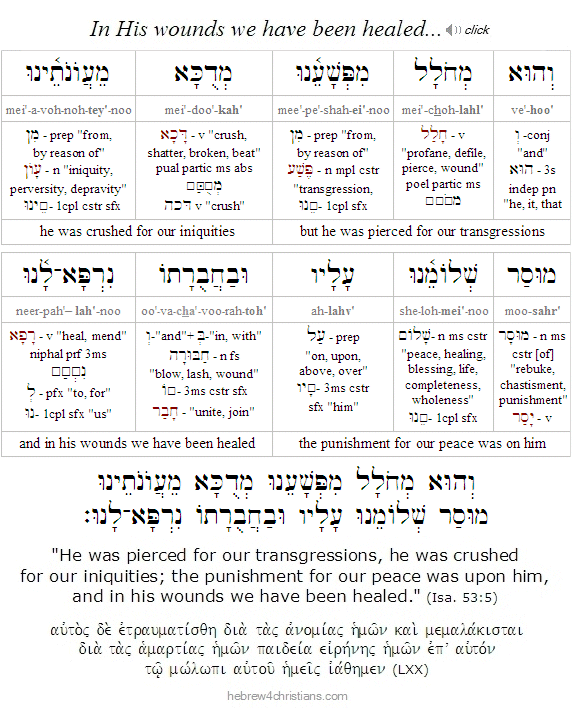 |
<< Return
|






















